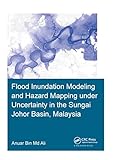FLOOD INUNDATION MODELING AND HAZARD MAPPING UNDER UNCERTAINTY IN THE SUNGAI JOHOR BASIN, MALAYSIA/ ANUAR BIN MD. ALI
Material type: TextPublisher: Leiden, Netherlands : CRC Press/Balkema, 2018Copyright date: ©2018Description: xvi, 160 pages: colour illustrations, colour maps; 24 cmContent type:
TextPublisher: Leiden, Netherlands : CRC Press/Balkema, 2018Copyright date: ©2018Description: xvi, 160 pages: colour illustrations, colour maps; 24 cmContent type: - text
- unmediated
- volume
- 9781138603349
| Item type | Current library | Collection | Call number | Status | Date due | Barcode | |
|---|---|---|---|---|---|---|---|
| Tesis | JPS HQ Library Main Library | General Collections | THESIS 627.516 (595.31) ANU (Browse shelf(Opens below)) | Available | 1000035891 |
Browsing JPS HQ Library shelves, Shelving location: Main Library, Collection: General Collections Close shelf browser (Hides shelf browser)
Includes index.
Bibliography: pages [133]-150
Chapter 1 Introduction -- Chapter 2 Literature Review -- Chapter 3 Study area and data availability -- Chapter 4 !-D hydraulic modelling: the role of cross-sections spacing -- Chapter 5 2-D hydraulic modelling: the role of digital elevation models -- Chapter 6 1-D hydraulic modelling: the role of digital elevation modes -- Chapter 7 Uncertainty in simulating design flood profiles and inundation maps on the Johor River, Malaysia -- Chapter 8 Conclusions and recommendations -- References -- Acknowledgements -- About author -- Index of notation and abbreviations.
Flood is a natural disaster that occurs almost regualrly in Malaysia particularly during the monsoon seasons. Hence, it is of no surprise that flood is considered one of the significant natural harzards in the country in terms of number of affected population, fatalities and economic damage. One of the efforts to minimize flood losses is providing useful information through floodplain inundations maps, i.e. spatial distribution of flood harzard. Traditionally, many modellers have used deterministic approaches in flood inundation modelling. Deterministic approaches are based on a single simulation with the "best fit model" and do not explicitly consider uncertainties in model parameters, terrain data, and model structure. When model results are then used to generate a flood harzard map, neglecting uncertainties may led to precise, but inaccurate maps and lead to wrong or misleading information to decision makers. Thus, the scientific literature has recently proposed a number of probabilistic methods to recognze, assess and account for uncertainties affecting flood inundation modelling. In this context, this research is the Sungai Johor river basin in Malaysia. Both 1-D and 2-D hydraulic models were utilized.
There are no comments on this title.

